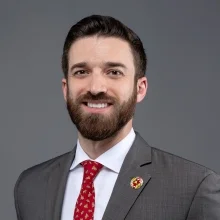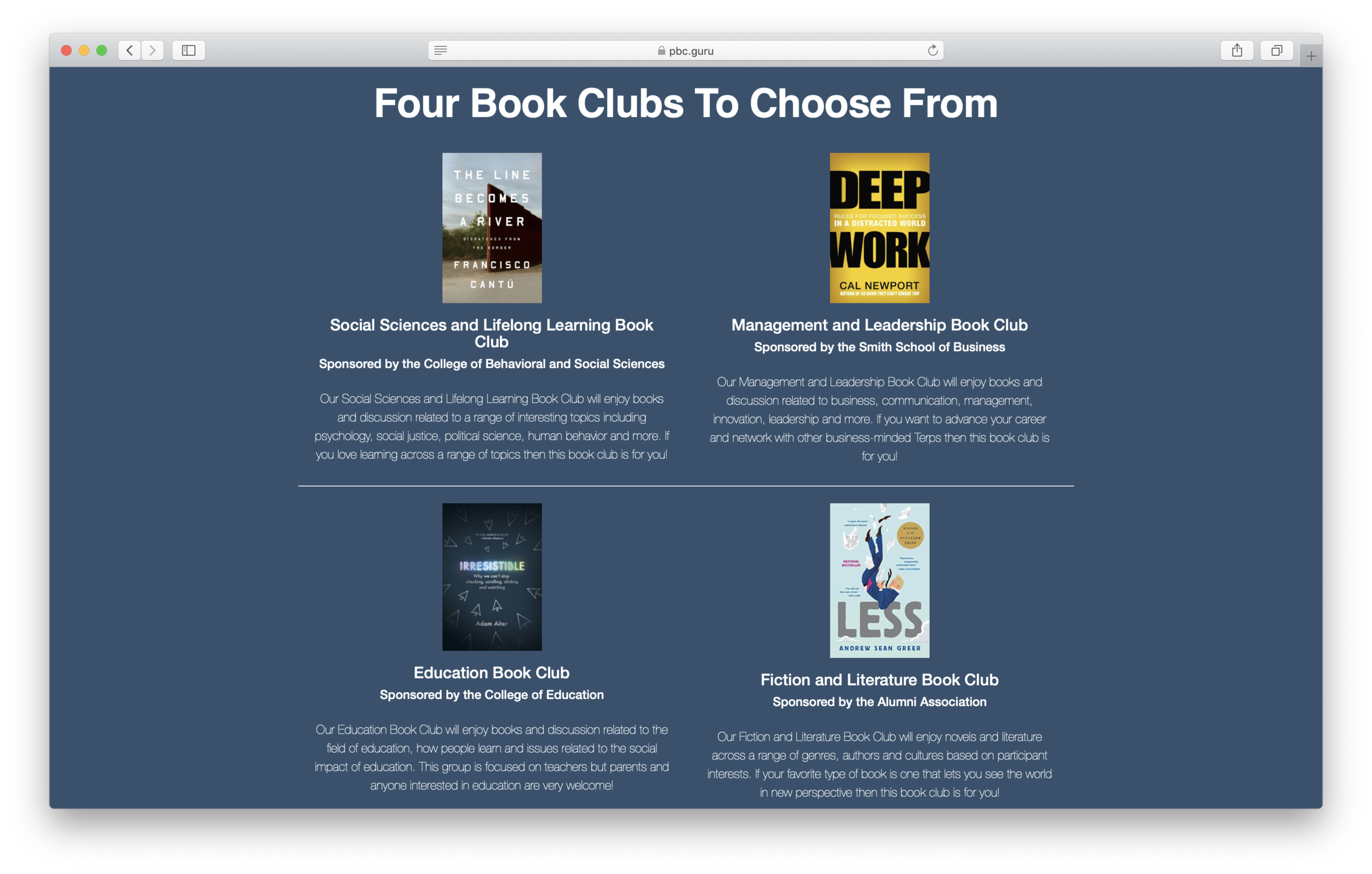If you could meaningfully engage hundreds of alumni who had never interacted with your institution before with a program that didn’t require staff time to run, you would, right?
We probably all would. But that might not stop us from being skeptical if we were told that the program that could do that is a virtual book club.
Well, the proof of the book club is in the reading. Jeff Williams, Associate Executive Director of Engagement and Outreach at the University of Maryland Alumni Association, and his team launched four book clubs in July and reached nearly 2,000 alumni in 46 states almost right away. Over a quarter of those had never engaged with the alumni association before. And they did it all with minimal staff time by partnering with an outside company to handle the program.
I spoke with Jeff to learn more about why UMD decided to implement the program, how it’s succeeded, and what those of us at other institutions can learn from its success. Jeff will be presenting on the topic at the CASE D2 Conference on March 25.
Why did you all choose to implement alumni book clubs at the University of Maryland?
Jeff Williams
JW: I met Zach Rubin, founder of PBC Guru, four years ago now. He messaged me as an alumnus of the Clark School of Engineering, where I worked. We started talking about book clubs—at the time, he was facilitating virtual book clubs for-profit companies, and he only had a handful of clients.
I have been involved in a book club before, and my parents and friends have all been involved in book clubs, and I thought Zach’s model was interesting because it was online and didn’t have limitations of time and place that most of our other programs have. The fact that you could participate at any time anywhere was interesting to me. One of our goals was to expand our geographic footprint, but we didn’t really have the time or resources to do a lot of events around the country. Doing that where you may only have ten alumni in Topeka, Kansas wasn’t a worthwhile endeavor. We were looking for virtual options, and this was a way to do that.
I also really liked the fact that it was about professional development. That’s something we know from alumni surveys and our conversations with alumni—help in their career and professional development is the number one thing that they want from their alma mater. So we’re always looking for new things to do to provide alumni with support in their career.
We launched the first book club at the Clark School of Engineering and immediately had several hundred people sign up for it. This was only for our Clark School alumni group. We picked four or five topics that we thought were relevant to engineering alumni: leadership and strategy for a more senior level professional, a new professional and recent graduate group, one on innovation and entrepreneurship, and one on general management and business. It totally blew out of the water what our expectations were. I thought that we’d maybe get five or ten people. It was a low cost and low barrier thing for us to do, so I figured it was worth trying. That we had hundreds of people signing up right off the bat really surprised us.
I ended up transitioning from our engineering school to our business school. When I was at the business school, we had this focus on growing our geographic footprint; engaging more alumni outside our traditional markets of DC, Baltimore, and New York; and offering alumni more professional development. The book club both hit our goals internally and hit on what alumni needed and expected from us. We launched a book club for the business school and got a similar response—hundreds of people signed up for it.
Then I moved to the University of Maryland Alumni Association, where I’m in a leadership position. In the meantime, a few other schools and colleges at Maryland had subscribed to the book club. Now that I’m here at at the alumni association, I am able to facilitate a centralized program.
When you described the groups you formed for the first book club for the School of Engineering, those sounded like career- and business-oriented books. Has that been true of later book clubs, or are they reading fiction and novels, too?
JW: We’ve expanded. At the schools of engineering and business, we were sticking to professional book clubs because we knew that was what alumni wanted from us—that they wanted to be able to have lifelong learning and professional development. But when I came to the alumni association and we centralized the University’s effort with the book clubs, we decided to launch a fiction book club. That actually has been one of the most popular book clubs—we were kind of surprised. I think it’s just that people just enjoy reading; it’s something that is easy to participate in. They’re already doing this, so the fact that they can do it with other alumni and engage in these discussions, it’s proven to be quite popular.
How do the book clubs work? I assume you assign a book to read and choose a date for discussion, but how does that occur?
JW: Actually, we don’t select a book! We set the clubs, the themes—our current ones are management and business, education, social justice, and fiction and literature. After we contracted with PBC Guru, we developed a marketing plan to get the word out about these clubs. We invited people to the clubs through email and social media almost exclusively, we did not do postal mail. We made a University of Maryland microsite where alumni go to register for the clubs. Once they register for the club, PBC Guru will pick three or four different books, and the people in the club will vote on the book they will read. So it’s audience choice, which is pretty cool.
Once the club is started, PBC Guru takes it over from there. They run the clubs, and they have a platform where alumni can go and read different content about the book. If the book is about leadership and strategy, they may post a TED Talk about how to inspire others. Then they relate the video or whatever the content is to the book they’re reading through thoughtful and provocative questions. Alumni can log in, respond to the questions, ask their own questions, and go back and forth with each other over the course of the book.
We have alumni who have volunteered to be discussion leaders, so when PBC Guru posts this content online, our volunteers will go and get the discussion going. That’s something we learned—sometimes it’s intimidating to be the first person to comment on something. If you have people who are interested in this and want to be involved, they can help get the ball rolling, and then the discussions are more active. Occasionally, we have featured books written by faculty and alumni, which is awesome. In the future, but we hope to have one of those authors lead a webinar discussion or event so they can speak more to the readers in the club.
How do you follow up with alumni beyond the book club?
JW: That’s the key. In alumni engagement, we always want an outcome. At the University of Maryland with everything we do at the alumni association, we want our programs and events to lead alumni to join, volunteer, advocate, and give on behalf of the University. We hope that, whether it’s a book club, an event, or a volunteer opportunity, alumni who participate will increase their involvement and engagement with the university. We track all the alumni who participate so that we can update their contact information if we need, and we’re able to follow up with them and say, “Thank you for participating, we’re glad that you have been involved. We want to make sure that you know about these other upcoming events if you’re interested in volunteering, here are ways you can get more involved.”
We have 46 out of 50 states represented in our book clubs. Over 7 percent of participants were from outside the US. This is all as of July 1, 2018, so we haven’t updated it yet this year—those are numbers from our initial launch. Close to 1,700 alumni signed up. Over a quarter of those alumni had never participated in alumni programs before. We’re opening the door to alumni who have never had a relationship with the alumni association prior to this program.
We have specific strategies of what we want to do now that they’re involved in a book club—maybe we want them to attend an event, or join the alumni association, or volunteer. It’s a great entry point.
And the University of Maryland Alumni Association is dues-based?
JW: We are a dues-based organization, but these book clubs are open to all alumni regardless of their membership status. One of the things we’ve thought about for the future is a way to offer a benefit to our members, maybe a free book or special access or something.
Close to five hundred people who signed up as of July had never attended our events, and they were not alumni association members. It’s been a great way for us to cast a wider net. Sometimes alumni don’t want to come to an in-person event—they don't have time, they don’t have interest, it’s not a convenient location for them. This is something they can participate in. As they develop that relationship with us, we’ve found that a lot of the alumni who are participating for the first time attended events after joining a book club. A number of people who had been previously unengaged joined a book club and continued to be more involved afterward.
I know it’s only been six months since you launched, but do you feel like the alumni association has got a good return on investment?
JW: It has definitely been a good investment. We couldn’t do this without PBC Guru.
You have your alumni who are already dedicated and engaged, but to get beyond that group can be hard—to get people who don’t typically open your email, who don’t typically come to your events, who aren’t yet a member. The book clubs are an effective way to develop a relationship with people we don’t yet have a relationship with. It has been a great addition to our programs. It’s achieved our internal goals, and it has supported alumni and is helping them achieve their goals.
What advice can you offer to people who are interested in doing something similar at their institutions?
JW: One thing to consider is how the books will be selected. We have the books selected by the participants, and that has worked for us, but some universities do things a different way.
Discussion leaders are helpful in keeping the groups active, and it’s a nice volunteer role. Featuring alumni, staff, and faculty authors when possible adds that next layer of engagement beyond just participation.
And then, what you asked before, “What’s your follow up plan?” The key to any good alumni relations program is in the follow up. You can have all these people engaged and you can have these great numbers and first-time attendees, but if this is the last thing they do, the program wasn’t successful. Prior to launching a book club, you have to ask yourself, “How are we tracking these people and coding them in our database? What is our follow up, and what are the next steps we’re asking them to do? Once they’re in the book club, what now?”
Have more questions about how UMD runs its book clubs? Connect with Jeff Williams on LinkedIn.





